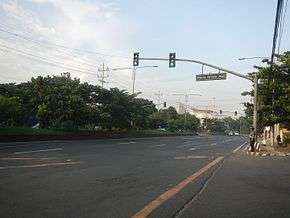Padre Burgos Avenue
| Padre Burgos Avenue | |
|---|---|
|
Padre Burgos Avenue looking east towards the National Museum of Fine Arts from Maria Orosa Avenue | |
| Route information | |
| Length: | 1.5 km[1] (0.9 mi) |
| Component highways: |
|
| Major junctions | |
| North end: | junctions of the MacArthur, Jones, and Quezon Bridges in Ermita |
| South end: | Bonifacio Drive and Roxas Boulevard in Ermita |
| Highway system | |
| Highways in the Philippines | |
Padre Burgos Avenue is a 14-lane important thoroughfare in Manila, Philippines. It was named after one of the martyred priests, Jose Burgos. It is a road in the center of the city providing access to several important thoroughfares like Taft Avenue, Rizal Avenue, Roxas Boulevard, and Quezon Boulevard. The avenue is a component of Circumferential Road 1 (C-1) of Manila's highway sysyem. The Manila City Hall can be accessed using this road, and so is the Rizal Park and Intramuros.
The road starts from the southern banks of the Pasig River at Liwasang Bonifacio, where MacArthur Bridge (leading to Rizal Avenue), Jones Bridge, and Quezon Bridge merge. MacArthur Bridge becomes Rizal Avenue, which leads to Caloocan. Quezon Bridge leads to Quiapo, the University of Santo Tomas, Far Eastern University, and España Boulevard to Quezon City. Padre Burgos continues south and it will branch to two, Taft Avenue and the Padre Burgos Extension when it reaches Rizal Park. Taft Avenue leads to Ermita, Malate, and Pasay. Padre Burgos will then turn sharply left, intersecting with Finance Drive, the major thoroughfare of Rizal Park which leads to Ayala Boulevard and Mendiola Street, the other parts of the C-1. Padre Burgos Avenue ends with a junction with Roxas Boulevard.
See also
| Wikimedia Commons has media related to Padre Burgos Avenue. |
Coordinates: 14°35′21″N 120°58′50″E / 14.58917°N 120.98056°E
References
- ↑ "Padre Burgos Avenue southbound". Google Maps. Google. Retrieved 13 December 2015.
